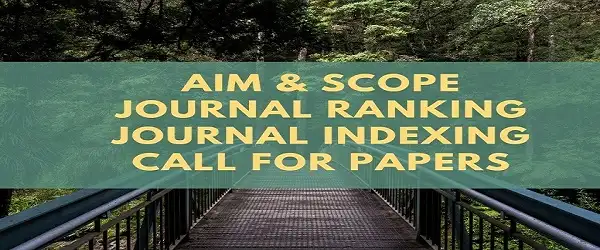Emission Control Science And Technology impact factor, indexing, ranking (2024)

Aim and Scope
The Emission Control Science And Technology is a research journal that publishes research related to Engineering; Environmental Science. This journal is published by the Springer International Publishing AG. The ISSN of this journal is 21993629, 21993637. Based on the Scopus data, the SCImago Journal Rank (SJR) of emission control science and technology is 0.515.
Also, please check the following important details about emission control science and technology: Publisher, ISSN, Ranking, Indexing, Impact Factor (if applicable), Publication fee (APC), Review Time, and Acceptance Rate.
According to Clarivate's JCR, journals indexed in SCIE/SSCI have an impact factor.
Emission Control Science And Technology Ranking
The Impact Factor of Emission Control Science And Technology is N/A.
The impact factor (IF) is a measure of the frequency with which the average article in a journal has been cited in a particular year. It is used to measure the importance or rank of a journal by calculating the times its articles are cited.
The impact factor was devised by Eugene Garfield, the founder of the Institute for Scientific Information (ISI) in Philadelphia. Impact factors began to be calculated yearly starting from 1975 for journals listed in the Journal Citation Reports (JCR). ISI was acquired by Thomson Scientific & Healthcare in 1992, and became known as Thomson ISI. In 2018, Thomson-Reuters spun off and sold ISI to Onex Corporation and Baring Private Equity Asia. They founded a new corporation, Clarivate, which is now the publisher of the JCR.
Important Metrics
| Journal Title: | Emission Control Science and Technology |
| Publisher: | Springer International Publishing AG |
| ISSN: | 21993629, 21993637 |
| Type: | journal |
| Journal Scope: | Engineering; Environmental Science |
| Country: | Switzerland |
| H-Index: | 20 |
| SJR: | 0.515 |
| Quartile: | Automotive Engineering (Q2); Management, Monitoring, Policy and Law (Q2); Pollution (Q2); Health, Toxicology and Mutagenesis (Q3) |
emission control science and technology Indexing
The emission control science and technology is indexed in:
An indexed journal means that the journal has gone through and passed a review process of certain requirements done by a journal indexer.
The Web of Science Core Collection includes the Science Citation Index Expanded (SCIE), Social Sciences Citation Index (SSCI), Arts & Humanities Citation Index (AHCI), and Emerging Sources Citation Index (ESCI).
Note: ESCI journals donot come with an impact factor. However, ESCI journals are evaluated every year and those who qualified are transferred to SCIE.
Emission Control Science And Technology Impact Factor 2024
The latest impact factor of emission control science and technology is N/A.
The impact factor (IF) is a measure of the frequency with which the average article in a journal has been cited in a particular year. It is used to measure the importance or rank of a journal by calculating the times it's articles are cited.
Note: Every year, The Clarivate releases the Journal Citation Report (JCR). The JCR provides information about academic journals including impact factor. The latest JCR was released in June, 2023. The JCR 2024 will be released in the June 2024.
Emission Control Science And Technology Quartile
The latest Quartile of emission control science and technology is Q2.
Each subject category of journals is divided into four quartiles: Q1, Q2, Q3, Q4. Q1 is occupied by the top 25% of journals in the list; Q2 is occupied by journals in the 25 to 50% group; Q3 is occupied by journals in the 50 to 75% group and Q4 is occupied by journals in the 75 to 100% group.
Call for Papers
Visit to the official website of the journal/ conference to check the details about call for papers.
How to publish in Emission Control Science And Technology?
If your research is related to Engineering; Environmental Science, then visit the official website of emission control science and technology and send your manuscript.
Tips for publishing in Emission Control Science And Technology:
- Selection of research problem.
- Presenting a solution.
- Designing the paper.
- Make your manuscript publication worthy.
- Write an effective results section.
- Mind your references.
Acceptance Rate
Acceptance rate is the ratio of the number of articles submitted to the number of articles published. Researchers can check the acceptance rate on the journal website. Alternatively, they can contact the editor of the journal.Journal Publication Time
The publication time may vary depending on factors such as the complexity of the research and the current workload of the editorial team. Journals typically request reviewers to submit their reviews within 3-4 weeks. However, some journals lack mechanisms to enforce this deadline, making it difficult to predict the duration of the peer review process.
The review time also depends upon the quality of the research paper.
Final Summary
- The impact factor of emission control science and technology is N/A.
- The emission control science and technology is a reputed research journal.
- It is published by Springer International Publishing AG.
- The journal is indexed in UGC CARE, Scopus, ESCI.
- The (SJR) SCImago Journal Rank is 0.515.
Sources: emission control science and technology
SIMILIAR JOURNALS
ISSN: 2666-7894
Publisher: ELSEVIER
PROCESS INTEGRATION AND OPTIMIZATION FOR SUSTAINABILITY
ISSN: 2509-4238Publisher: SPRINGERNATURE
ENVIRONMENTAL PROGRESS & SUSTAINABLE ENERGY
ISSN: 1944-7442Publisher: WILEY
ENVIRONMENTAL GEOCHEMISTRY AND HEALTH
ISSN: 0269-4042Publisher: SPRINGER
GEFAHRSTOFFE REINHALTUNG DER LUFT
ISSN: 0949-8036Publisher: SPRINGER-V D I VERLAG GMBH & CO KG
JOURNAL OF ENVIRONMENTAL ENGINEERING
ISSN: 0733-9372Publisher: ASCE-AMER SOC CIVIL ENGINEERS
STOCHASTIC ENVIRONMENTAL RESEARCH AND RISK ASSESSMENT
ISSN: 1436-3240Publisher: SPRINGER
CLEANER ENGINEERING AND TECHNOLOGY
ISSN: 2666-7908Publisher: ELSEVIER
ISSN:
Publisher: MDPI
ENVIRONMENTAL QUALITY MANAGEMENT
ISSN: 1088-1913Publisher: WILEY
TOP RESEARCH JOURNALS
- Agricultural & Biological Sciences
- Arts & Humanities
- Business, Management and Accounting
- Chemistry
- Computer Science
- Education
- Engineering
- Mathematics
- Medicine
- Physics
- Social Sciences